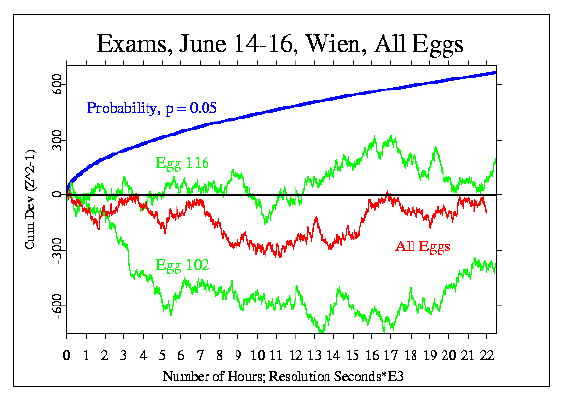|
One of our more difficult questions relates to the relative locality of
influences on the REG devices. An ingoing assumption is that the
effects seen in REG-based consciousness research are non-local, in the
sense that there is no causal linkage that depends on close spatial
proximity. There is a temporal aspect of non-locality as well, but
as explained elsewhere, we limit our explorations to the spatial domain.
In addition to simple distance in space, there is a consideration of
"distance" in consciousness space, which we may refer to as "relevance."
If an event is known to and important to a group of people in a
particular location, this may generate a greater effect in proportion to
the degree of relevance. In this context, we may also see some
relatively larger effects that might be attributed to an individual
such as the Egg-host for a particular Egg, in analogy to the
"experimenter effect" documented in the parapsychological literature,
and "expectation" effects seen in psychological and medical research.
Robert Pucher suggested that the EGG data might respond to the intense
engagement of students in their final exam period at a Technical
University in Wien, Austria, where he hosts one of two Viennese Eggs.
Date: Mon, 19 Jun 2000 11:25:29 +0200
From: pucher
To: rdnelson
Subject: Egg 116, local event, 90 persons envolved.
Hi Roger!
I just wanted to inform you that our students of the last
semester had their final exams from June 14th to June 16th.
The exams started at 8:00 end at around 11:30 and started
again at 13:00 and ended at around 17:00. This exam is a
very important local event for about 90 persons. So maybe
the Egg showed something.
best regards
Robert Pucher
=============================================
DI Dr. Robert Pucher
TECHNIKUM WIEN
Fachbereichsleiter Informatik
FH - Studiengang Elektronik
=============================================
These times and dates were used to extract the data corresponding to the
exams, and the six blocks of data were concatenated, yielding a period
of 22.5 hours. The cumulative deviations of the second-by-second scores
for two individual Eggs and for the composite of all Eggs in the GCP
network are
shown in the following figure. Egg 116 is hosted at the Technical
University, while Egg 102 is hosted elsewhere in Wien by Peter Mulascz,
who is not associated with the University and who was not aware of the
exams. None of the traces shows a significant accumulated deviation,
but the most "relevant" Egg, 116, shows a modest positive trend,
especially after the midpoint.
This outcome is consistent with the general GCP hypothesis, namely that
important global events, engaging the attention of large numbers of
people in a coherent fashion, may introduce order into the otherwise
random data sequences.

|